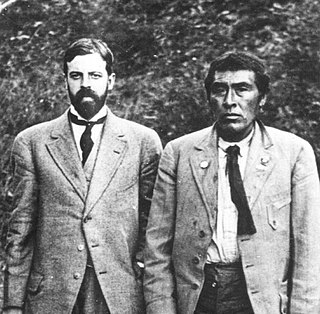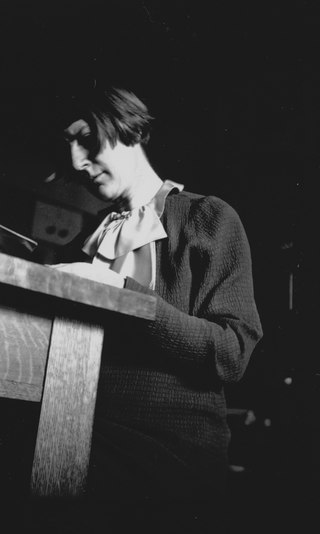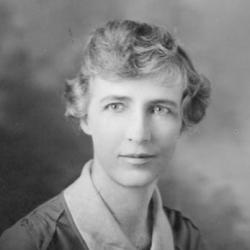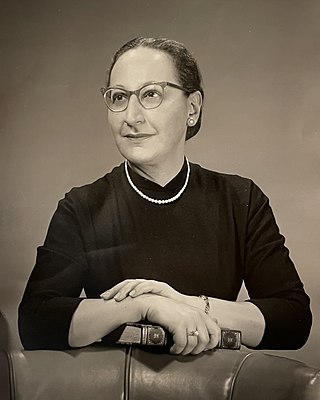Related Research Articles

Margaret Mead was an American cultural anthropologist who featured frequently as an author and speaker in the mass media during the 1960s and the 1970s.

Alfred Louis Kroeber was an American cultural anthropologist. He received his PhD under Franz Boas at Columbia University in 1901, the first doctorate in anthropology awarded by Columbia. He was also the first professor appointed to the Department of Anthropology at the University of California, Berkeley. He played an integral role in the early days of its Museum of Anthropology, where he served as director from 1909 through 1947. Kroeber provided detailed information about Ishi, the last surviving member of the Yahi people, whom he studied over a period of years. He was the father of the acclaimed novelist, poet, and writer of short stories Ursula K. Le Guin.

Cora Alice Du Bois was an American cultural anthropologist and a key figure in culture and personality studies and in psychological anthropology more generally. She was Samuel Zemurray Jr. and Doris Zemurray Stone-Radcliffe Professor at Radcliffe College from 1954. After retirement from Radcliffe, she was Professor-at-large at Cornell University (1971–1976) and for one term at the University of California, San Diego (1976).

Ruth Landes was an American cultural anthropologist best known for studies on the Brazilian religion of Candomblé and her published study on the topic, City of Women (1947). Landes is recognized by some as a pioneer in the study of race and gender relations.
Pliny Earle Goddard was an American linguist and ethnologist noted for his extensive documentation of the languages and cultures of the Athabaskan peoples of western North America. His early research, carried out under the auspices of the University of California, Berkeley, focused on the Hupa and adjacent Athabaskan groups in northwestern California. After moving to New York in 1909 at the invitation of Franz Boas his scope expanded to include the Athabaskans of the Southwest, Canada, and Alaska. During the 1910s and 1920s. as Boas's junior colleague at the American Museum of Natural History and Columbia University, Goddard played a major role in creating the academic infrastructure for American Indian linguistics and anthropology in North America.

Inez Fung is a professor of atmospheric science at the University of California, Berkeley, jointly appointed in the Department of Earth and Planetary Science and the Department of Environmental Science, Policy and Management. She is also the co-director of the Berkeley Institute of the Environment.

Smadar Lavie is a Mizrahi U.S.-Israeli anthropologist, author, and activist. She specializes in the anthropology of Egypt, Israel and Palestine, emphasizing issues of race, gender and religion. Lavie is a professor emerita of anthropology at the University of California, Davis, and a visiting scholar at the Department of Ethnic Studies, University of California, Berkeley. Lavie received her doctorate in anthropology from the University of California at Berkeley (1989) and spent nine years as assistant and associate professor of anthropology at the University of California, Davis. She authored The Poetics of Military Occupation, receiving the 1990 Honorable Mention of the Victor Turner Award for Ethnographic Writing, and Wrapped in the Flag of Israel: Mizrahi Single Mothers and Bureaucratic Torture receiving the 2015 Honorable Mention of the Association of Middle East Women's Studies Book Award Competition. Wrapped in the Flag of Israel's first edition was also one of the four finalists in the 2015 Clifford Geertz Book Award Competition of the Society for the Anthropology of Religion. She also co-edited Creativity/Anthropology and Displacement, Diaspora, and Geographies of Identity. Lavie won the American Studies Association's 2009 Gloria Anzaldúa Prize for her article, “Staying Put: Crossing the Palestine-Israel Border with Gloria Anzaldúa,” published in Anthropology and Humanism (2011). In 2013, Smadar Lavie won the “Heart at East” Honor Plaque for lifetime service to Mizraḥi communities in Israel-Palestine.
Leslie Spier was an American anthropologist best known for his ethnographic studies of American Indians. He spent a great deal of his professional life as a teacher; he retired in 1955 and died in 1961.
Carol Laderman was a groundbreaking medical anthropologist, specializing in the study of pregnancy and childbirth practices, shamanism, and Southeast Asian cultures, particularly Malays in rural Terengganu, Malaysia. She was also a critically acclaimed writer and a longtime professor and lecturer who had just been re-elevated to Chairmanship of the Department of Anthropology at City College at the time of her death.
Leith Patricia Mullings was a Jamaican-born author, anthropologist and professor. She was president of the American Anthropological Association from 2011–2013, and was a Distinguished Professor of Anthropology at the Graduate Center of the City University of New York. Mullings was involved in organizing for progressive social justice, racial equality and economic justice as one of the founding members of the Black Radical Congress and in her role as President of the AAA. Under her leadership, the American Anthropological Association took up the issue of academic labor rights.

Gladys Amanda Reichard was an American anthropologist and linguist. She is considered one of the most important women to have studied Native American languages and cultures in the first half of the twentieth century. She is best known for her studies of three different Native American languages: Wiyot, Coeur d'Alene and Navajo. Reichard was concerned with understanding language variation, and with connections between linguistic principles and underpinnings of religion, culture and context.
Ernestine Friedl was an American anthropologist, author, and professor. She served as the president of both the American Ethnological Society (1967) and the American Anthropological Association (1974–1975). Friedl was also the first female Dean of Arts and Sciences and Trinity College at Duke University, and was a James B. Duke Professor Emerita. A building on Duke's campus, housing the departments of African and African American Studies, Cultural Anthropology, the Latino/Latina Studies program, and Literature was named in her honor in 2008. Her major interests included gender roles, rural life in modern Greece, and the St. Croix Chippewa Indians of Wisconsin.
Dorothy Agnes Bennett was an American anthropologist, astronomer, curator, publisher, and author. She was the first assistant curator of the Hayden Planetarium, and co-created the Little Golden Books franchise.

Gitel (Gertrude) Poznanski Steed was an American cultural anthropologist known for her research in India 1950–52 involving ethnological work in three villages to study the complex detail of their social structure. She supplemented her research with thousands of ethnological photographs of the individuals and groups studied, the quality of which was recognised by Edward Steichen. She experienced chronic illnesses after her return from the field, but nevertheless completed publications and many lectures but did not survive to finish a book The Human Career in Village India which was to integrate and unify her many-sided studies of human character formation in the cultural/historical context of India.

Lila Morris O'Neale was an American anthropologist and historian of textiles. She was awarded a Guggenheim Fellowship in 1931 for her research on prehistoric textiles in Peru.

Khiara M. Bridges is an American law professor and anthropologist specializing in the intersectionality of race, reproductive justice, and law. She is best known for her book, Reproducing Race: An Ethnography of Pregnancy as a Site of Racialization, in which she argues that race and class largely affect the prenatal, childbirth, and postnatal experiences of women.
Vera Mae Green was an American anthropologist, educator, and scholar, who made major contributions in the fields of Caribbean studies, interethnic studies, black family studies and the study of poverty and the poor. She was one of the first African-American Caribbeanists and the first to focus on Dutch Caribbean culture. She developed a "methodology for the study of African American Anthropology" that acknowledged the diversity among and within black families, communities and cultures. Her other areas of research included mestizos in Mexico and communities in India and Israel. "[C]ommitted to the betterment of the human condition", Green also focused her efforts toward international human rights.

Ethel M. Albert was an American ethnologist. Albert conducted ethnological research related to speech, values, and ethics, employing a cross-cultural approach studying different social classes, ethnic groups, and locations. Albert conducted research with the Navajo (Diné) in the American southwest and the Rundi people in the Republic of Burundi. Albert is most well known among late twentieth-century American semiotics researchers for reviving semiotics in the American university curriculum.
Dorothy L. Keur was an American cultural anthropologist specializing in Navajo and Netherlands cultures. She was a professor at Hunter College and was the president of the American Ethnological Society from 1974 to 1979.
Lesley A. Sharp is an American medical anthropologist. She is the Barbara Chamberlain & Helen Chamberlain Josefsberg ’30 Professor of Anthropology at Barnard College.
References
- ↑ Dorsey, Chianta (2016-01-25). "50 Years/50 Collections: Notes From the Anthropologist Inez Adams on Race and Integration". amistadresearchctr. Retrieved 2023-03-31.
- ↑ "Adams, Inez (Dorothy Inez)". Amistad Research Center.
- ↑ Wright, Earl (2010). "The Tradition of Sociology at Fisk University". Journal of African American Studies. 14 (1): 44–60. ISSN 1559-1646. JSTOR 41819235.